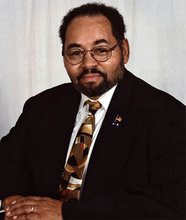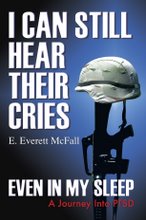May 10, 2008
By
Jennifer Litz Editor
 The founders of the new PTSD treatment center in San Angelo,
The founders of the new PTSD treatment center in San Angelo, First Gulf War veteran Steve Olness and paramedic Rosendo
"Rosey" Velez. ( Photo/Sarah Balderas)
Combating P.T.S.D. and Preventing SuicidesOne of the most progressive treatment centers for Post Traumatic
Stress Disorders in the country is coming to San Angelo, made
possible by an $80,000 grant from the TRIAD Fund of Permian
Basin Area Foundation. But what’s really special about the new
center at 2607 Johnson Street is not its christening by foundation
funds. The people conducting counseling services there are not your
typical government bureaucratic types. They’re veterans of war,
and even Ground Zero.
Gulf War vet Steve Olness is program manger for veteran’s services
for Mental Health Mental Retardation Services of the Concho Valley.
MHMR will share digs on Johnson Street with Emergency Services
Respite Center to provide care for recently returned soldiers and
other crisis responders suffering from Post Traumatic Stress
Disorder.
“I was in the army in the first Gulf War, and when we came back,
there was nothing like this,” says Olness. “Our war was nothing
like this one, but there was nobody waiting to try to get you used
to civilian life again. Or get you used to peacetime. There wasn’t
anything. We just came back, and a lot of guys who got out of the
military right after that, you got a handshake and goodbye.”
Olness says the soldiers coming back from tours in Iraq and
Afghanistan are going to need lot of help—and so are the military
resources set up to receive them.
“It’s going to be like a tidal wave,” Olness says. “Because some
of these
kids are pulling three, four, and five tours over there. And when you pull an 18-year-old kid fresh out of high
school, send him to training and he goes to a combat area, and
all he knows is what he was taught to do, sometimes that means
he has to take another person’s life. And then he comes back
home, and everyone lauds him as a hero—but he doesn’t feel
like a hero.”
Olness says there’s a stigma to having PTSD. “If a [solider comes
back with] diagnosed PTSD, the
military has to pay ‘x’ numberof dollars for the rest of his life,” he says. “It is easier for them
to say, ‘You’re not doing your job; you’re late for formation; I hear
you’ve had problems with your wife . . .’, they take the easy way...
because it’s easier to put him out of the military and give him
limited benefits if any at all.”
Olness says the new program will offer counseling to vets without
the stigma. “If you’re on active duty, you get labeled right away,”
he says. “You don’t want to be the NCO that is in charge of troops
that’s the guy that can’t handle it. He’s done his time in combat, and
now he’s training other troops, and you don’t want to be trained by
a guy who can’t take it.” The program created with TRIAD funds
features counselors and doctors on staff who can see patients and
even prescribe medicine. Many staffers are veterans themselves.
The Problem with the VA Pat Dugan was a reconnaissance marine corporal in Vietnam for
19 months, starting in 1966. “There’s a big difference between
being a combat person and a non-combat person,” explains Pat
Dugan. “I’m a marine, and I’m proud to be a marine, but I’m
even more proud to be a combat marine.” He’s now a
passionate voice for veteran help that resounds throughout
West Texas. Dugan says
the problem with the Departmentof Veteran’s Affairs, is that they haven’t delivered on the promise, such as: the military will take care of you for
your service.
Instead, Dugan, like Olness, paints the picture of
a disrespectful,mainly incompetent VA system. He foresees bad times ahead
for the “kids” currently turning several tours, who will come home
to bureaucratic red tape rather than help from government agencies.
“I am seeing one of the biggest mushroom clouds,” Dugan says of
times ahead for Iraq/Afghanistan veterans. “’Cause I’m thinking,
the public runs around with yellow ribbons on their cars, but what
I don’t see, except with Congressman Ciro Rodriguez (TX-23), is
people realizing that everyone in this war has PTSD. Because there
are no front lines in this war. You can be [in a non-combat service]
and get your butt blown off the road there with anyone else.
Everyone’s sitting around waiting for an explosion to go off,
and they send you back and back for more tours.”
When these vets do come back home—or in between myriad
deployments—
they’re still fighting—for their benefits. “In
Del Rio, for example, we’ve got people with problems,”
Dugan says. “And they have to travel 150 miles to get help
[at a VA clinic]. And then when you get up there, I’m not being mean,
but when you go up there and apply to get help, you get some
VA muffin that’s not a veteran, and they put you through mental
gymnastics like you wouldn’t believe.
[Vets] don’t want to behumiliated and go through that process.”
Dugan praises programs like the new MHMR/ESRC building.
He can even name one state agency that does things right—
The Texas Veteran’s Commission, whom he sees as a shining
example for others like it.
“I think the Texas Veteran’s Commission is as fine as any in
the US,” he says. “They treated me with dignity and respect,
talked with me, and took their time with me. They are an
example.” Conversely, Dugan describes nightmarish situations
at Audie Murphy Memorial Veterans Hospital and others.
During one visit, Dugan was chastised loudly for allowing an
80-year-old woman on oxygen to cut ahead of him for treatment.
Another time, Dugan was rebuked for offering his Marine Corps
serial number as identification. “We don’t use those anymore, we
only use social security numbers,” an administrator scoffed. But
Dugan says the Corps had taught him to be proud of his serial
number. Everyone has a social security number; Dugan felt he
earned that serial number.
“I was so pissed off, I came home and gave my Jack Russell
Terrier my serial number, so now he’s 2164539USMC,” Dugan
says. “That was my rebuke to the VA.” But not only do many
vets express their feeling that VA administrators, many of who
have never served, lack respect for veterans, they also lack some
basic “industry” knowledge. “One of my friends had a Navy Cross
—it’s the second highest medal awarded, for an extreme act of
heroism,” Dugan says. He walked into the VA, and the lady asked
him [about a combat action ribbon]. She said they didn’t issue those
until ’71, and he had gotten out of the service in ‘69. So she says,
‘Do you have any proof that you saw combat?’ And he said, ‘I got a
Navy Cross, does that count?’ And she said, [thinking is was akin to
a Blue Cross/Blue Shield policy]
‘Did I ask you about your insurance? I asked you about your
Combat Action Ribbon!’
She didn’t even know what a Navy Cross was.
She thought it was insurance.” ------------------------------------>
The VA has set up a 24-hour suicide hotline
round-the-clockaccess to mental health professionals.
The number is
1-800-273- 8255 (TALK).To learn more about PTSD-- visit the
National Center for PTSD website.
------------------------------------>
Flashback, Posttraumatic Stress Disorder, Suicide, and the Lessons of WAR by
Penny Colemanand--->
I Can Still Hear Thier Cries, Even In My Sleep...
A Journey Into PTSD By
E. Everett McFallBoth Books are Available on Amazon.com
Posted by E. Everett McFall at
10:28 PM









